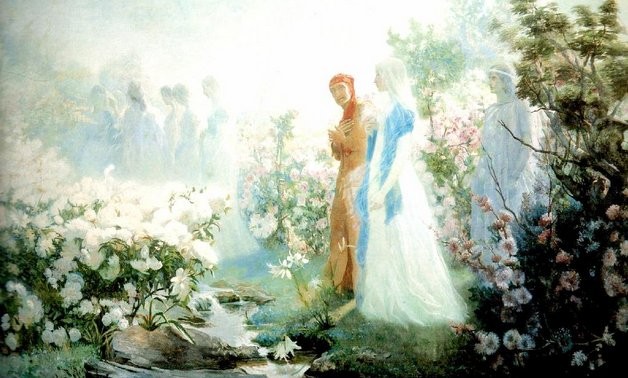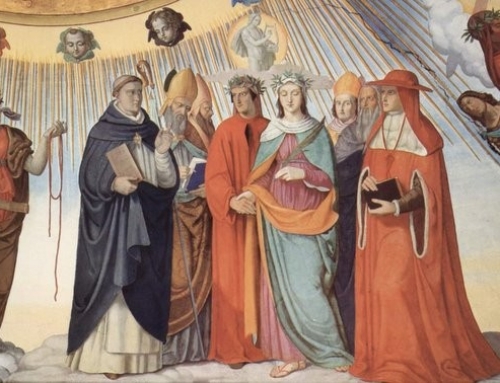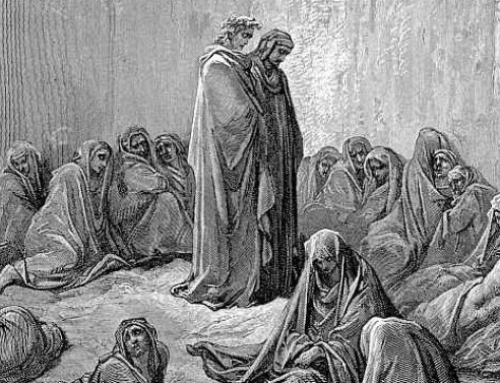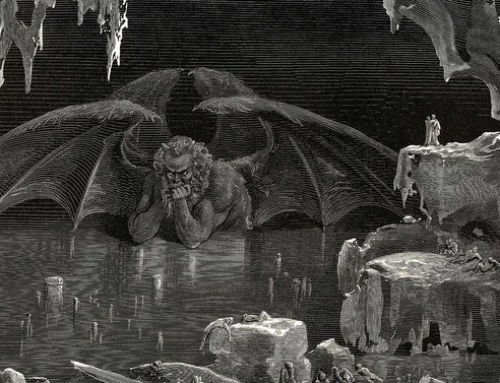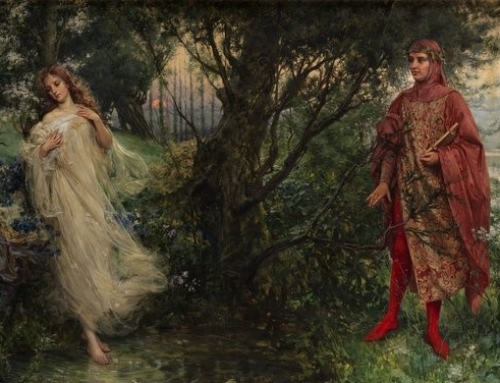This is the fifth of our series The Summa in Verse.
Dante’s vision of the afterlife centers upon two features: order and motion. The world is truly ordered and orderly, and yet within it there is great movement. It is clear to all that there is order within the world, that the world follows certain rules and fits together in a definite way. Scientists study the physical rules of the universe, and the rules they discover are so precise and unchanging that we implicitly trust their findings—no one questions whether the science underlying airplanes is sound or not before boarding. But the world is more than matter. We have minds that understand and wills that love; mere atoms can neither will nor love. And within that world of willing and loving there is another order. That spiritual order is what Dante explores; it is the same order that St. Thomas Aquinas describes in his great Summa Theologiae, in which he lays out the structure of the spiritual world as richly as any great cathedral.
Dante’s journey through the afterlife is an exploration of the ultimate meaning of human life. He wants to describe what it looks like to be truly human. We have freedom, we determine what we do and who we will become, but what is the framework for those decisions? What happens when we choose to love one thing rather than another? From the standpoint of the afterlife he sees the final consequences of human actions, where they ultimately lead. He sees what happens if one leads one type of life or another. Most importantly, he sees what it means to be fully human and how to lead a life of true freedom as a human. What Dante finds is the road to true happiness.
That happiness is attained within an order. Just as a doctor knows which symptoms are signs of what diseases, and which medicines will counteract those diseases, so too does Dante see which actions lead to happiness and which do not. The spiritual order that Dante sees shows him how to be human, just as the physical order tells an engineer how a plane must be built.
This knowledge enables Dante to show his readers how to live. The Divine Comedy is a how-to book: given the reality of what it means to be human, this is how to live a human life. Dante’s own path through the poem is a journey toward becoming more human. Thus the motion of the poem. While the order is the stage, the action is the journey. Man’s freedom leaves open the possibility of taking the route to happiness or not—where in the poem do you want to end up? And that journey toward your final place within the cosmic order is the epic journey of life. Aquinas tells us the same. A journey is determined by its destination, and so Aquinas begins his treatment of man’s life by discussing possible destinations one can live for. He argues that the only goal that can satisfy man’s hunger for happiness and fulfillment is God. Just as Dante shows that only those in heaven are truly happy, so Aquinas starts his treatment of the moral life at Dante’s destination.
However, we make this journey not by walking, but by loving. Dante walks through the afterlife, but what determines his destiny is what he chooses to love. The damned in hell are there because they want to be there—they have decided to love something beneath their dignity, and so are eternally ruined. They have used their freedom poorly. Those in purgatory have chosen well, but need that choice to be purified so that they can join those who love perfectly.
The goal of life is to love perfectly Him who is Himself perfect Love. We are created by God in order to know and love God—that is what we are for, that is the rationale behind the whole ordering of this world. We find our happiness in loving Him who is worthy of our complete love. To love God’s creatures as if they were God leads only to the misery of Hell. Those in Hell have chosen it by their love—God simply gives them what they want, and what they want is the misery of loving something that can never make them happy.
And in that misery is the extinction of freedom. We all want to be happy, but by loving something less than God as if it were God the damned lose their ability to be happy. They get what they choose, but on the deepest level they lose what (or Whom) they were made for and most truly desire. They are free to be miserable, but not free to be happy. Their freedom is a sham in that they have used it only to undo any possibility of being fully human and attaining true happiness. Satan is frozen because, as the prince of Hell, he is the least free person in all of creation.
The road to happiness is the freedom of the saints in paradise. In the journey that is our lives, that is what we must aim for. In Paradise we find our fullest selves made perfect and happy to an extent that even Dante cannot fully describe. It is when we are in Paradise that we can say that our epic journey ended not as a tragedy, but as a comedy.
That comedy is the Divine Comedy. We cannot make it on our own, but need divine aid—just as Dante had the help of Virgil and Beatrice, so we too have help. God provides the grace we need to make our journey back to Him. Within the ordered world God created, He draws us to Himself in heaven.
What Dante narrates in poetry, Aquinas explicates in theology. Aquinas starts with the source of all order, God the creator. He then explains man’s role in that order, and finally man’s motion back to God through Jesus. Although using different mediums, Dante and Aquinas paint the same reality. It is then up to us, with the help of God’s grace, to complete our own lives in light of that knowledge.
✠
Image: Cristobal Rojas, Dante and Beatrice on the Banks of the Lethe

